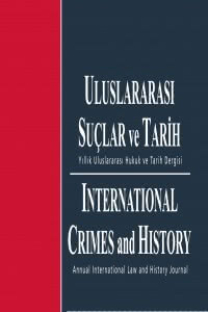Machiavelli'nin Hegemonya ve Güç Kavramsallaştırmasının Uluslararası Hukuk ile İlişkisi
Bu çalışmada, Machiavelli'nin güç ve hegemonya kavramsallaştırmaları, uluslararası hukuk düşüncesinin ve uluslararası düzenin oluşumu temelinde tartışılmaktadır. Bu kavramsallaştırmalar, Machiavelli'nin 1512-1517 yılları arasında kaleme aldığı Prens ve Söylevler adlı eserleri temel alınarak analiz edilmektedir. Machiavelli bu kavramları, yıkıcı çatışmalara bir çözüm olarak birlik ve düzen aramak amacıyla incelemiştir. Machiavelli'nin siyaset anlayışındaki en önemli özelliklerinden birisi yaşadığı dönemi aşan önermeler ortaya koymasıdır. Machiavelli, düşünme ve kavramsallaştırma sürecinde, gözlem yöntemini kullanmış ve deneyimlerini takip etmiştir. Temel kavramlarını üretirken ve yapılandırırken gözlem metodolojisini ve deneyimlerini kullanmasına rağmen, siyasi kavramları döneminin mevcut koşullarından farklı bir şekilde ortaya koymuş ve yapılandırmıştır. Machiavelli'nin güç ve hegemonya kavramsallaştırmasında, olası çatışmaların önlenmesinin amaç olduğu görülmektedir. Bu makalede, Machiavelli'nin güç ve hegemonya kavramsallaştırmalarının, kabul edilebilir bir uluslararası hukuk düzeninin oluşturulması için bir temel olarak uluslararası hukuk düşüncesine bir çerçeve sağlayıp sağlamadığı tartışılmaktadır.
Anahtar Kelimeler:
Machiavelli, hegemonya, güç, düzen, hukuk, uluslararası hukuk düşüncesi
MACHIAVELLI’S CONCEPTUALIZATION OF HEGEMONY AND POWER IN RELATION WITH INTERNATIONAL LEGAL THOUGHT
In this paper, the conceptualizations of the power and hegemony of Machiavelli are discussed based on the formation of international legal thought and international order. These conceptualizations are analyzed based on Machiavelli’s pieces, the Prince and Discourses which were written by Machiavelli between 1512-1517. Machiavelli studied these concepts to search for unity and order as a solution to devastating conflicts. One of the most important characteristics of Machiavelli in his political understanding depends on his transcendence of the period he had lived. In his thinking and conceptualization, he used the observation method and followed up his experiences. Despite his usage of observation, methodology, and experiences in the production and configuration of his basic concepts, he introduced and configured political concepts differently from the existing circumstances of his period. In Machiavelli’s conceptualization of power and hegemony, it is seen that the prevention of the eruption of conflict is the goal. In this paper, whether Machiavelli’s conceptualization of power and hegemony provides a framing of international legal thought as a basis for the formation of an acceptable international legal order is discussed.
Keywords:
Machiavelli, hegemony, power, order, law, international legal thought,
___
- Arnhart, Larry. Siyasi Düşünce Tarihi: Plato’dan Rawls’a, (Ankara: Adres Yayınları, 2004).
- Chabod, Federico. “An Introduction to the Prince” in Machiavelli and the Renaissance, trans. David Moore, Harper Torchbooks TB 1193 (New York: Harper and Row, 1965).
- Colish L., Marcia. The Idea of Liberty in Machiavelli, Journal of the History of Ideas, Vol.32, No.3 (University of Pennsylvania Press, 1971).
- Fleisher, Martin. “A Passion for Politics: The Vital Core of the World of Machiavelli” in Machiavelli and the Nature of Political Thought, Martin Fleisher ed. (New York: Atheneum, 1972).
- Fontana, Benedetto. Hegemony and Power: On the Relation Between Gramsci and Machiavelli, (London: University of Minnesota Press).
- Foucault, Michel. “Governmentality”, in The Foucault Effect: Studies in Governmentality, ed. Graham Burchell, Colin Gordon, and Peter Miller, (Chicago: Chicago University Press, 1991a).
- Machiavelli, Niccolo. Discourses on the First Decade of Titus Livius, (EBook, #10827).
- Maihofer, Werner. “The Ethos of the Republic and the Reality of Politics” in in Gisela Bock, Quentin Skinner and Maurizio Viroli (eds.), Machiavelli and Republicanism, (UK: Cambridge University Press, 1990).
- Mansfield C., Harvey. On the Impersonality of the Modern State: A Comment on Machiavelli’s Use of Stato, The American Political Science Review, Vol.77, No.4, (American Political Science Association, 1983).
- Mattingly, Garrett. Machiavelli’s Prince: Political Science or Political Satire?, The American Scholar, No.27, (The American Scholar Association, 1958).
- McCoy N.R., Charles. The Place of Machiavelli in the History of Political Thought, The American Political Science Review, Vol.37, No.4, (American Political Science Association, 1943).
- Skinner, Quentin. “Machiavelli’s Discorsi and the Pre-Humanist Origins of Republican Ideas”, in Gisela Bock,
- Quentin Skinner and Maurizio Viroli (eds.), Machiavelli and Republicanism, (UK: Cambridge University Press, 1990).
- Wood, Neal. The Value of Asocial Sociability: Contributions of Machiavelli, Sidney and Montesquieu, in Machiavelli and the Nature of Political Thought, ed. Martin Fleisher (New York: Atheneum, 1972).
- ISSN: 1306-9136
- Yayın Aralığı: Yıllık
- Başlangıç: 2006
- Yayıncı: Terazi Yayıncılık Basım Dağıtım Danışmanlık Eğitim Organizasyon Matbaacılık Kırtasiye Tic. Ltd. Şti.
Sayıdaki Diğer Makaleler
İmparatorluk Ve Baskın Fetret Dönemleri
SÜRYANİ AYAKLANMALARI KILIFINDA SÖZDE SÜRYANİ “SOYKIRIMI” İDDİALARI
SİLAHSIZLANMA VE SİLAHLARIN KONTROLÜ HUKUKU
Machiavelli'nin Hegemonya ve Güç Kavramsallaştırmasının Uluslararası Hukuk ile İlişkisi
AB - BALKANLAR GENİŞLEME SÜRECİ ÇIKMAZI: ALGILAR, İSTİKRAR VE TAVSİYELERİN ROLÜ
Soykırım Yasağı Normunun Yaşam Döngüsü: Aktörler, Motivasyonlar ve Mekanizmalar
